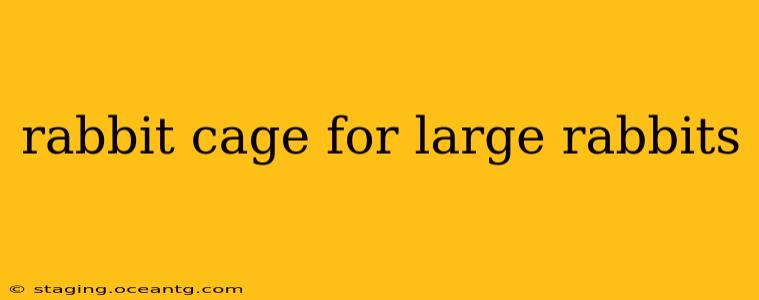Finding the perfect rabbit cage can feel overwhelming, especially when you're dealing with a large breed rabbit. These larger bunnies need significantly more space than their smaller counterparts to thrive and maintain their physical and mental well-being. This guide will help you navigate the options and select a spacious, safe, and enriching home for your big bunny.
What Size Cage Do Large Rabbits Need?
The general rule of thumb is that a rabbit's cage should be at least four times the length of your rabbit and twice its width. For large breeds like Flemish Giants or Flemish Rabbits, this translates into a substantial amount of space. A small cage will quickly become a source of stress and frustration for your rabbit, leading to behavioral problems like excessive chewing or aggression. Don't underestimate the size you need!
How much space does a giant rabbit need?
Giant breeds like Flemish Giants require exceptionally spacious cages. Think multiple levels, significant floor space, and ample room to hop, stretch, and explore. A cage that's cramped will not only impact their physical health but also their mental well-being, leading to boredom and unhappiness.
Types of Cages Suitable for Large Rabbits
Several types of enclosures cater to the needs of large rabbits. Consider these options:
-
Large Multi-Level Cages: These cages offer increased vertical space, allowing your rabbit to climb and explore different levels. Look for sturdy construction and easy-to-clean materials.
-
Custom-Built Cages: If you're exceptionally handy, a custom-built cage offers the ultimate flexibility in size and design. You can tailor it to your rabbit's specific needs and the available space in your home. Remember to consider safety and escape-proofing!
-
Outdoor Rabbit Hutches: For rabbits that spend time outdoors (with appropriate climate control and protection from predators), a large hutch can provide a spacious environment. Ensure it offers ample ventilation and protection from the elements.
-
Indoor/Outdoor Runs: These can be connected to a cage or hutch, providing additional space for exercise and exploration. Consider the strength and security of the run to ensure your rabbit can't escape.
What Features to Look for in a Large Rabbit Cage?
Beyond size, consider these crucial features when selecting a cage for your large rabbit:
-
Sturdy Construction: A well-made cage is vital to prevent escape attempts and ensure safety. Choose durable materials that can withstand your rabbit's chewing and playful antics. Solid wood or wire with a strong frame are ideal.
-
Easy Cleaning: Rabbits can be messy. A cage with easy-to-clean surfaces and removable trays will simplify your cleaning routine, keeping your rabbit's environment sanitary.
-
Good Ventilation: Proper ventilation prevents the buildup of ammonia, a dangerous gas produced by rabbit urine. Avoid cages that are poorly ventilated.
-
Safe Materials: Ensure that the materials used in the cage are non-toxic and safe for your rabbit. Avoid cages with sharp edges or small parts that your rabbit could chew and ingest.
-
Secure Locking Mechanism: A strong locking mechanism is essential to prevent escapes, particularly important for active and curious large breeds.
What about alternative housing options?
While a cage is typically recommended as the primary living space for rabbits, many people augment them with additional space:
What about using a playpen?
Playpens are great for supervised playtime, offering a safe area for your rabbit to explore indoors. However, they shouldn't replace a suitable cage for sleeping and resting. Consider a sizable playpen to give your rabbit ample space.
Can I let my large rabbit free-roam?
Free-roaming offers benefits like increased exercise, but requires significant rabbit-proofing of your home. This involves removing hazards, securing electrical cords, and creating a safe and stimulating environment. Never leave a free-roaming rabbit unsupervised.
Maintaining a Clean and Safe Environment for Your Large Rabbit
Regular cleaning is vital to maintain your rabbit's health and prevent the build-up of harmful bacteria. Spot clean daily, and perform a thorough cage cleaning at least once a week. Always use rabbit-safe cleaning products.
Choosing the right cage is a significant step in providing a happy and healthy home for your large rabbit. Remember, a happy rabbit is a healthy rabbit; prioritize size, safety, and comfort to ensure your furry friend thrives.
